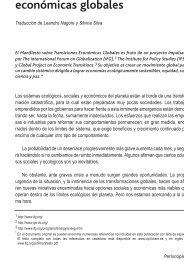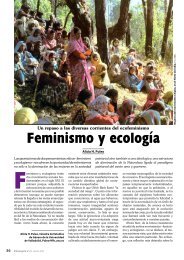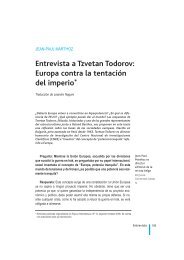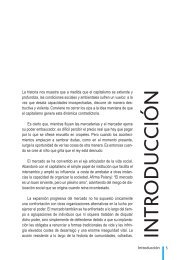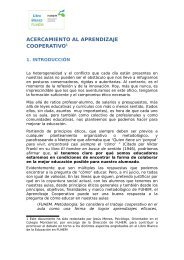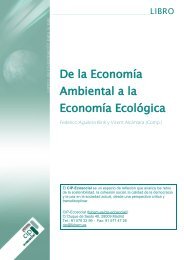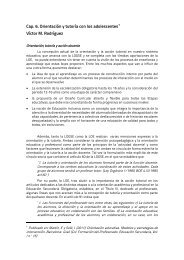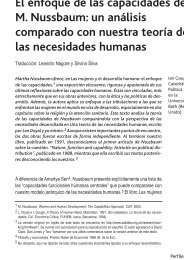CRISTINA BORDERÍAS, CRISTINA CARRASCO Y TERESA TORNS— (2007). “Autonomy, Depen<strong>de</strong>nce, or Display? The Relationship Between MarriedWomen’s Earnings and Housework”, Journal of Marriage and Family 69: 399-417.GUPTA, Sanjiv, y ASH, Michael (2008). “Whose Money, Whose Time? A NonparametricApproach to Mo<strong>de</strong>ling Time Spent on Housework in the United States”, FeministEconomics 14 (1): 93-120.GUTTORMSSON, Loftur (2002). “Las relaciones paternofiliales”, en KERTZER, Daniel I., yBARBAGLI, Marzio (comps.), La vida familiar <strong>de</strong>s<strong>de</strong> la Revolución Francesa hasta laPrimera Guerra Mundial (1789-1913). Barcelona: Paidós.HACOURT, Wendy (ed.) (1994). Feminist Perspectives on Sustainable Development.Londres: Zed Press.HAMINGTON, Maurice, y MILLER, Dorothy (2006). Socializing care: Feminist ethics andpublic issues. EE UU: Rowlan&Litttelfield.HANTRAÏS, Linda, y LETABLIER, Marie-Théresè (1997). “The gen<strong>de</strong>r of paid and unpaidwork time: a European problem”, Time and Society 6: 131-150.HARTMANN, Heidi (1976). “Capitalism, Patriarchy, and Job Segregation by Sex”, Signs 1(3): 137-169.HELLER, Agnes (1977). Sociología <strong>de</strong> la vida cotidiana. Barcelona: Península.HERNES, Helga (1987). Welfare State and Women Power. Essays in State Feminism. Oslo:Norwegian University Press.— (1987). “Cronopolitics: A time to live and a time to work”, en HERNES (1987). WelfareState and Women Power. Essays in State Feminism. Oslo: Norwegian UniversityPress.HEWITSON, Gillian (1999). Feminist Economics. Interrogating the Masculinity of RationalEconomic Man. Massachusetts: Edward <strong>El</strong>gar.— (2003). “Domestic labor and gen<strong>de</strong>r i<strong>de</strong>ntity: are all women carers?”, en BARKER yKUIPER (2003). Toward a Feminist Philosophy of Economics. Londres y Nueva York:Routledge.HEWITT, Guy (1999). “Commonwealth Secretariat’s Gen<strong>de</strong>r-Sensitive Budget Initiative”,Workshop on Pro-Poor, Gen<strong>de</strong>r-and Environment-Sensitive Budgets UNDP,junio, 28-30.HIMMELWEIT, Susan (1995). “The Discovery of ‘Unpaid Work’: The Social Consequencesof the Expansion of Work”, Feminist Economics 1 (2): 1-19.— (1998). “The Need for Gen<strong>de</strong>r Impact Analysis”, en ROBINSON, Sarah (ed.), ThePurse or The Wallet?, Proceedings of the Women’s Budget Group Seminar, Church HouseConference Centre, Westminster, Londres, 12 <strong>de</strong> febrero. Londres: Fawcett So -ciety.— (ed.) (2000). Insi<strong>de</strong> the Household: From Labour to Care. Londres: MacMillan PressLtd.— (2002). “Making Visible the Hid<strong>de</strong>n Economy: The Case for Gen<strong>de</strong>r-ImpactAnalysis of Economic Policy”, Feminist Economics 8 (1): 49-70.— (2003). “An evolutionary approach to feminist economics: two different mo<strong>de</strong>ls ofcaring”, en BAKKER, Isabella, y KUIPER, Edith (2003). Toward a Feminist Philosophy ofEconomics. Londres y Nueva York: Routledge.— (2005). “Caring. The need for an economic strategy”, Public Policy Research 12 (3):168-173.— (2007). “The prospects for Caring: Economic Theory and Policy Analysis”, CambridgeJournal of Economics 31 (4): 581-600.HOCHSCHILD, Arlie (2001a). “Las ca<strong>de</strong>nas mundiales <strong>de</strong> afecto y asistencia y la plusvalíaemocional”, en GIDDENS, Anthony, y HUTTON, Will (eds.), En el límite: La vida en elcapitalismo global. Barcelona: Tusquets.88
INTRODUCCIÓN— (2001b). The Time Bind: When Work Becomes Home and Home Becomes Work. NuevaYork: Metropolitan Press.— (2002). Global women: nannies, maids and sex workers in the new economy. NuevaYork: Holt.— (2003). The commercialization of intimate life. Notes from home and work. Berkeley:University of California Press. [Traducción castellana en La mercantilización <strong>de</strong> lavida íntima. Buenos Aires: Katz Editores, 2008.]HOCHSCHILD, Arlie, y MACHUNG, Anne (1989). The second shift: working parents and therevolution at home. Nueva York: Viking PenguinHORRELL, Sara, y HUMPHRIES, Jane (1995). “Women’s labour work participation and thetransition to the male breadwinner family”, Economic History Review 48: 89-117.HUMPHRIES, Jane (1998). “Female-hea<strong>de</strong>d households in early industrial Britain: thevanguard of the proletariat?”, Labour History Review 63 (1): 30-65.— (2010). Childhood and child labour in the British Industrial Revolution. Cambridge:Studies in Economic History.IRONMONGER, Duncan (1996). “Counting outputs, capital inputs, and caring labor:Estimating gross household product”. Feminist Economics 2 (3): 37-64.— (2004). “Bringing up Bobby and betty: the inputs and outputs of childcare time”,en FOLBRE, Nancy, y BITTMAN, Michael (2004). Family Time. Londres-Nueva York:Roudledge.IZQUIERDO, María Jesús (2004). “Del sexismo y la mercantilización <strong>de</strong>l cuidado a susocialización: Hacia una política <strong>de</strong>mocrática <strong>de</strong>l cuidado”, en CONGRESO INTERNA-CIONAL SARE: Cuidar cuesta. Costes y beneficios <strong>de</strong>l cuidado. Gasteiz: EMAKUNDE-Comunidad Europea-Fondo Social Europeo.JACQUARD, Albert (2006). Mon Utopie. París: Calmann-Lévy.JOCHIMSEN, Maren, y KNOBLOCH, Ulrike, (1997). “Making the Hid<strong>de</strong>n Visible: TheImportance of Caring Activities and Their Principles for Any Economy”, EcologicalEconomics 20 (2): 107-112.KANE, Nancy M. (1989). “The Home Care Crisis of the Nineties”, The Gerontogist 29 (1):24-31.KITTAY, Eva (1999). Love’s Labor. Essays on Women, Equality and Depen<strong>de</strong>ncy. Londres:Routledge.KLASEN, Stephan (2007). “Gen<strong>de</strong>r-related Indicators of Well Being”, en MCGILLIVRAY,Marc (ed.), Human Well Being: Concept and Measurement. Londres: Palgrave.KNIBIEHLER, Yvonne, y FOUQUET, Catherine (1977). L’Histoire <strong>de</strong>s mères et <strong>de</strong> la maternitéen Occi<strong>de</strong>nt. París: Montalba.KNIJN, Trudie, y KREMER, Monique (1997). “Gen<strong>de</strong>r and the caring dimension of welfarestates: toward inclusive citizenship”, Social Politics 4 (3): 328-361.KUHN, Thomas (1962). The structure of scientific revolutions. Chicago: University ofChicago Press. [Traducción castellana en Estructura <strong>de</strong> las revoluciones científicas.México: FCE, 1971.]KUIPER, Edith, y SAP, Jolan<strong>de</strong> (eds.) (1996). Out of the Margin, Feminist Perspectives onEconomics. Londres y Nueva York: Routledge.— (1996). “Introduction”, en KUIPER, Edith, y SAP, Jolan<strong>de</strong> (eds.) (1996). Out of theMargin, Feminist Perspectives on Economics. Londres y Nueva York: Routledge.LECCARDI, Carmen (1996). “Rethinking social time: Feminist perspectives”, Time andSociety 5: 169-186.LELLI, Sara (2008). “Operationalising Sen’s capability approach: the influence of theselected technique”, en COMIM, Flavio, QIZILBASH, Mozaffar, y ALKIRE, Sabine (eds.),The Capability Approach. Cambridge: Cambridge University Press.89
- Page 4 and 5:
CRISTINA CARRASCOPROFESORA DE TEOR
- Page 6 and 7:
COLECCIÓN ECONOMÍA CRÍTICA Y ECO
- Page 8 and 9:
CAPÍTULO 5. EL DESCUBRIMIENTO DEL
- Page 10 and 11:
PRESENTACIÓNposibles y diversas ac
- Page 13 and 14:
INTRODUCCIÓNEL TRABAJO DE CUIDADOS
- Page 15 and 16:
INTRODUCCIÓNy su nuevo interés po
- Page 17 and 18:
INTRODUCCIÓNUN APUNTE SOBRE EL TRA
- Page 19 and 20:
INTRODUCCIÓNEL IMPACTO DE LA INDUS
- Page 21 and 22:
INTRODUCCIÓNde trabajo cambió rad
- Page 23 and 24:
INTRODUCCIÓN“ganador-de-pan” (
- Page 25 and 26:
INTRODUCCIÓNmecanización hacían
- Page 27 and 28:
INTRODUCCIÓNdesarrolladas anterior
- Page 29 and 30:
LA EMERGENCIA DEL TRABAJO DE CUIDAD
- Page 31 and 32:
INTRODUCCIÓN2005; Carrasco, 2001;
- Page 33 and 34:
INTRODUCCIÓNitalianas Balbo (1980)
- Page 35 and 36:
INTRODUCCIÓNEn concreto, aquella q
- Page 37 and 38: INTRODUCCIÓNEuropea por crear empl
- Page 39 and 40: INTRODUCCIÓNsoporte y cuidado emoc
- Page 41 and 42: INTRODUCCIÓNproductivo y mercantil
- Page 43 and 44: INTRODUCCIÓNy las mujeres, en part
- Page 45 and 46: INTRODUCCIÓNde organizar los cuida
- Page 47 and 48: INTRODUCCIÓNcontinuum entre los de
- Page 49 and 50: INTRODUCCIÓNTRABAJO DE CUIDADOS, R
- Page 51 and 52: INTRODUCCIÓNpermanece oculto no es
- Page 53 and 54: INTRODUCCIÓNde manera diferenciada
- Page 55 and 56: INTRODUCCIÓNsocial, particularment
- Page 57 and 58: INTRODUCCIÓN2002; Budlender, Sharp
- Page 59 and 60: INTRODUCCIÓNapareciendo el trabajo
- Page 61 and 62: INTRODUCCIÓNcaracterísticas medio
- Page 63 and 64: INTRODUCCIÓNlibro de Borderías et
- Page 65 and 66: INTRODUCCIÓNLas siguientes limitac
- Page 67 and 68: INTRODUCCIÓNAhora bien, a pesar de
- Page 69 and 70: INTRODUCCIÓNque dichas actividades
- Page 71 and 72: INTRODUCCIÓNtrabajo doméstico—
- Page 73 and 74: INTRODUCCIÓNOtro aspecto que defin
- Page 75 and 76: INTRODUCCIÓN5. Estas ideas tambié
- Page 77 and 78: INTRODUCCIÓN29. En España, la con
- Page 79 and 80: INTRODUCCIÓNaños ochenta. La auto
- Page 81 and 82: INTRODUCCIÓNALKIRE, Sabine (2008).
- Page 83 and 84: INTRODUCCIÓNBORDERÍAS, Cristina,
- Page 85 and 86: INTRODUCCIÓNCROMPTON, Rosemary (20
- Page 87: INTRODUCCIÓN— (1994). Who Pays f
- Page 91 and 92: INTRODUCCIÓNNUSSBAUM, Martha, y SE
- Page 93 and 94: INTRODUCCIÓNROSE, Sonya O. (1992).
- Page 95: INTRODUCCIÓN— (2008). “Políti



